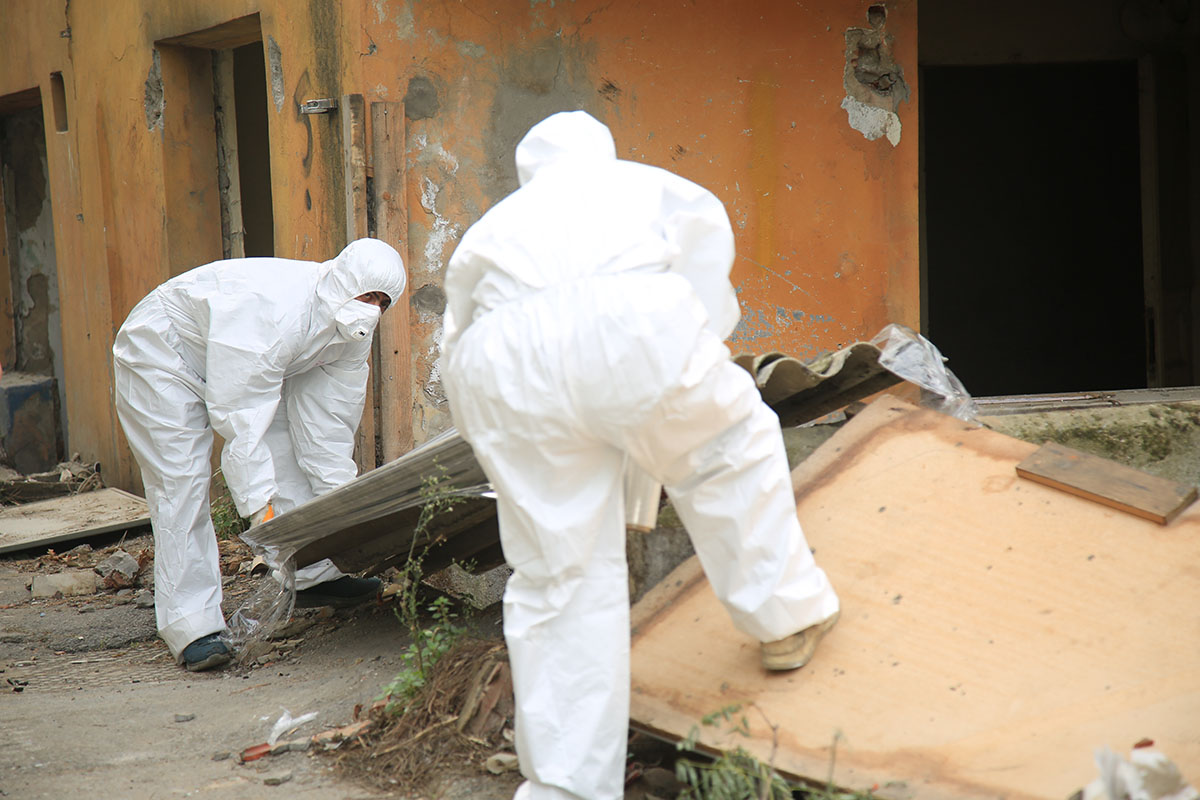Overview of Asbestos Abatement
Asbestos abatement refers to the process of removing or reducing asbestos in buildings and other structures. This is crucial for protecting the health of veterans who may have been exposed to asbestos during their service. The main goals of these programs include:
- Identifying asbestos-containing materials in military facilities.
- Implementing safe removal practices to minimize exposure.
- Ensuring proper disposal of asbestos waste to prevent environmental contamination.
Importance of Abatement Programs
Abatement programs are vital for several reasons:
- Health Protection: They help reduce the risk of serious health issues, such as lung cancer and mesothelioma, which are linked to asbestos exposure.
- Legal Compliance: These programs ensure that military facilities comply with federal and state regulations regarding hazardous materials.
- Veteran Support: They provide veterans with access to safer environments, promoting overall well-being.
Veterans’ Access to Abatement Services
Veterans can access abatement services through various channels:
- VA Health Care: Veterans can receive information and support regarding asbestos exposure through their VA health care providers.
- Community Programs: Local organizations may offer resources and assistance for veterans needing abatement services.
- Educational Resources: The VA provides materials to help veterans understand their rights and the services available to them.
Health Risks Associated with Asbestos Exposure
Common Asbestos-Related Diseases
Asbestos exposure can lead to several serious health issues, particularly for veterans. Some of the most common diseases include:
- Mesothelioma: A rare cancer that affects the lining of the lungs, abdomen, or heart. Epithelioid mesothelioma is the most common type, often linked to asbestos exposure, and affects the epithelial cells that line the organs.
- Asbestosis: A chronic lung disease caused by inhaling asbestos fibers, leading to scarring of lung tissue.
- Lung Cancer: Increased risk of asbestos lung cancer in veterans, especially among those who smoke.
Long-Term Health Impacts
The effects of asbestos exposure may not appear until many years later. Long-term health impacts can include:
- Breathing Difficulties: Persistent shortness of breath and coughing.
- Chest Pain: Discomfort or pain in the chest area.
- Increased Risk of Other Cancers: Besides lung cancer, exposure can lead to other types of mesothelioma cancer.
Preventive Measures for Veterans
Veterans can take steps to reduce their risk of asbestos-related diseases:
- Regular Health Check-Ups: Early detection can lead to better outcomes.
- Avoiding Asbestos Exposure: Stay away from known asbestos-containing materials.
- Education and Awareness: Understanding the risks associated with asbestos can help in prevention.
Eligibility Criteria for VA Benefits
Service Requirements
To qualify for VA benefits, veterans must meet certain service criteria:
- Must have served full-time in the military, including the Army, Navy, Air Force, Marine Corps, or Coast Guard.
- Discharge status must not be dishonorable.
- For those who enlisted after September 7, 1980, or began active duty after October 16, 1981, a minimum of 24 months of continuous service is required unless there are exceptions.
Medical Documentation Needed
Veterans need to provide specific medical documents to support their claims:
- Proof of military service and discharge status.
- Medical records showing any health issues related to service.
- Evidence of exposure to harmful substances like asbestos.
Exposure Summary and Evidence
To strengthen their claims, veterans should gather evidence regarding their exposure:
- Detailed accounts of when and where they were exposed to asbestos.
- Any medical evaluations or diagnoses related to asbestos exposure.
- Testimonies or statements from fellow service members who can confirm exposure.
Filing a VA Claim for Asbestos-Related Diseases
Steps to File a Claim
- Gather Medical Documentation: Veterans need to collect medical records that confirm a diagnosis of an asbestos-related disease, such as epithelioid mesothelioma or lung cancer.
- Provide Exposure Summary: Document your military service, including job roles and locations where asbestos exposure occurred.
- Submit the Claim: Complete the VA claim form and submit it along with all necessary documents to the VA.
Common Challenges and Solutions
- Challenge: Proving the connection between military service and the disease.
- Solution: Obtain a written statement from a doctor linking the illness to asbestos exposure during service.
- Challenge: Delays in processing claims.
- Solution: Stay organized and follow up regularly with the VA to check the status of your claim.
- Challenge: Navigating the paperwork.
- Solution: Consider working with a VA-accredited claims agent who can guide you through the process.
Role of VA-Accredited Claims Agents
- Assistance with Documentation: They help veterans gather and organize the necessary paperwork for claims.
- Expert Guidance: Claims agents understand the VA system and can provide valuable advice on how to strengthen your claim.
- Support Throughout the Process: They can represent veterans during the claims process, ensuring that all steps are followed correctly.
Treatment Options for Veterans with Mesothelioma
Veterans diagnosed with epithelioid mesothelioma can benefit from a variety of treatment approaches, including surgery, chemotherapy, and radiation.
Surgical Treatments
Surgery is often a key option for treating mesothelioma. It can involve:
- Removing Tumors: Surgeons may take out the tumor and some surrounding tissue.
- Pleurectomy: This involves removing part of the lining of the lungs.
- Decortication: This is the removal of the tumor from the lung surface.
Chemotherapy and Radiation
Chemotherapy and radiation are common treatments that help manage mesothelioma. They can:
- Shrink Tumors: These treatments can reduce the size of tumors before surgery.
- Kill Cancer Cells: They target and destroy cancer cells in the body.
- Manage Symptoms: They can help relieve pain and other symptoms.
Access to Specialist Care
Veterans have access to specialized care for mesothelioma. This includes:
- Top Specialists: The VA connects veterans with leading experts in mesothelioma treatment.
- Travel Assistance: The VA may help with travel costs for treatment.
- Veterans Choice Program: Eligible veterans can receive care outside the VA if they live far from a facility or cannot get an appointment quickly.
It is crucial for veterans to discuss their treatment options with their doctors to find the best plan for their needs.
Legal Options for Veterans Affected by Asbestos
Filing an Asbestos Lawsuit
Veterans diagnosed with asbestos-related diseases, like mesothelioma, have the option to file a lawsuit. Here are some key points to consider:
- Eligibility: Many veterans can file claims, as over 30% of mesothelioma lawsuits in the U.S. are from veterans.
- Consult an Attorney: It’s important to speak with a lawyer who specializes in asbestos cases to understand your rights and options.
- Potential Compensation: Lawsuits can provide financial support for medical bills and other expenses.
Impact on VA Benefits
Filing a lawsuit does not affect VA disability benefits. Here’s what veterans should know:
- No Double Dipping: The VA does not consider money from lawsuits when calculating benefits.
- Income Considerations: While the VA looks at income for some benefits, compensation from lawsuits does not count against disability payments.
- Seek Guidance: Veterans should consult with claims agents to explore all compensation options available.
Finding Legal Assistance
Getting help from the right legal professionals is crucial. Here are steps to find support:
- Research: Look for attorneys who have experience with asbestos cases and veterans’ rights.
- Ask for Referrals: Reach out to veteran organizations for recommendations on trusted lawyers.
- Free Consultations: Many attorneys offer free initial consultations to discuss your case and options.
Support Resources for Veterans and Families
Veterans and their families facing the challenges of asbestos-related illnesses have access to various support resources. These resources can provide essential assistance during difficult times.
VA Health Care Services
- Comprehensive Medical Care: Veterans can receive a range of medical services tailored to their needs, including treatment for asbestos-related diseases.
- Mental Health Support: Counseling and mental health services are available to help veterans cope with the emotional impact of their conditions.
- Specialized Programs: The VA offers programs specifically designed for veterans with unique health issues, including those related to asbestos exposure.
Financial Assistance Programs
- Disability Compensation: Veterans may qualify for monthly payments if their illness is connected to their military service.
- Housing Grants: Financial help is available for veterans needing assistance with housing costs.
- Educational Benefits: Programs exist to support veterans in pursuing education and training, helping them transition to civilian life.
Support Groups and Counseling
- Peer Support Groups: Connecting with other veterans who have similar experiences can provide comfort and understanding.
- Family Counseling: Resources are available for families to help them navigate the challenges of caring for a veteran with a serious illness.
- Community Resources: Local organizations often offer additional support, including workshops and informational sessions for veterans and their families.
Historical Use of Asbestos in the Military
Branches Most Affected
Asbestos was widely used across various branches of the U.S. military. The following branches were particularly impacted:
- Navy: Asbestos was commonly found in ships and shipyards.
- Air Force: Many bases had buildings containing asbestos materials.
- Army: Soldiers often encountered asbestos in older structures during deployments.
Common Military Applications
Asbestos was used in many military applications due to its fire-resistant properties. Some common uses included:
- Insulation: Used in ships and buildings to protect against heat.
- Brake linings: Found in military vehicles to withstand high temperatures.
- Construction materials: Used in barracks and other facilities.
Legacy Asbestos Exposure
The legacy of asbestos use in the military has led to long-term health risks for veterans. Key points include:
- Delayed Symptoms: Many veterans may not show symptoms of asbestos-related diseases like mesothelioma until decades later.
- High Risk Occupations: Jobs like shipyard work and construction had the highest exposure rates.
- Ongoing Health Issues: Veterans continue to face health challenges related to past asbestos exposure.
Preventing Future Asbestos Exposure
Current Military Safety Protocols
To protect service members from asbestos exposure, the military has implemented several safety measures:
- Regular Inspections: Military facilities undergo routine checks to identify and manage asbestos-containing materials.
- Training Programs: Personnel receive training on recognizing asbestos hazards and safe handling practices.
- Personal Protective Equipment (PPE): Service members are provided with appropriate gear to minimize exposure risks during maintenance or construction work.
Asbestos Removal Initiatives
Efforts to remove asbestos from military sites include:
- Abatement Projects: Specialized teams are deployed to safely remove asbestos from buildings and ships.
- Public Awareness Campaigns: Information is shared with veterans and active-duty personnel about the dangers of asbestos and how to avoid exposure.
- Collaboration with Experts: The military works with environmental agencies to ensure safe removal and disposal of asbestos materials.
Education and Training Programs
Ongoing education is crucial for preventing future exposure:
- Workshops and Seminars: Regular sessions are held to educate service members about asbestos risks and safety practices.
- Resource Materials: Informational brochures and online resources are made available to ensure all personnel are informed.
- Feedback Mechanisms: Service members are encouraged to report unsafe conditions, helping to improve safety protocols.
Survivor Benefits for Families of Veterans
Dependency and Indemnity Compensation
Dependency and Indemnity Compensation (DIC) is a monthly payment for the surviving spouse or children of a veteran who died due to a service-related condition. To qualify for DIC, the following must be true:
- The veteran’s death must be connected to their military service.
- The cause of death can be a disease or injury that happened during active duty.
- Additional payments may be available for dependents needing extra help.
VA Burial Benefits
Families of veterans can receive burial benefits to help cover funeral costs. Key points include:
- A burial allowance of up to $2,000 is available for service-related deaths.
- Families must show proof of payment for the burial.
- The veteran’s death must be linked to a service-related disability, like mesothelioma from asbestos exposure.
Financial Assistance Programs
Various financial assistance programs are available to support families:
- Housing Grants: Help with housing costs for eligible families.
- Educational Training: Programs to assist with education and job training.
- Counseling Services: Support for emotional and mental health needs.
These benefits aim to ease the financial burden on families after the loss of a veteran.
Navigating the VA Claims Process
Understanding the Process
Navigating the VA claims process can be challenging for veterans. Here are some key points to keep in mind:
- Gather Necessary Documents: Collect all required paperwork, including your discharge status, medical records, and any evidence of asbestos exposure.
- Complete the Right Forms: Use the correct VA forms, such as VA Form 21-526 for disability compensation. Make sure to fill them out accurately to avoid delays.
- Submit Your Claim: You can file your claim online or at a local VA office. Ensure that you keep copies of everything you submit.
Common Pitfalls to Avoid
Many veterans face obstacles when filing claims. Here are some common mistakes to watch out for:
- Incomplete Documentation: Failing to provide all necessary documents can lead to claim denial. Always double-check your submission.
- Missing Deadlines: Be aware of any time limits for filing claims. While there may not be strict deadlines for post-service claims, delays can complicate the process.
- Not Seeking Help: Don’t hesitate to reach out for assistance. VA-accredited claims agents can provide valuable guidance.
Tips for a Successful Claim
To improve your chances of a successful claim, consider these tips:
- Stay Organized: Keep all your documents in one place and maintain a checklist of what you need.
- Follow Up: After submitting your claim, follow up with the VA to check on its status.
- Be Patient: The claims process can take time. Stay patient and persistent in your efforts.
The Role of VA-Accredited Claims Agents
How They Assist Veterans
VA-accredited claims agents play a crucial role in helping veterans navigate the complex process of filing claims for benefits. They provide support in several ways:
- Guidance on Documentation: They help veterans gather necessary documents, such as service records and medical evidence.
- Understanding VA Terms: They explain important VA terms and conditions, making it easier for veterans to complete forms correctly.
- Claim Submission: They assist in filling out and submitting claims to ensure all information is accurate and complete.
Finding a Qualified Agent
Finding the right VA-accredited claims agent can make a significant difference in the claims process. Here are some tips:
- Check Accreditation: Ensure the agent is officially accredited by the VA.
- Look for Experience: Choose an agent with a proven track record in handling asbestos-related claims.
- Read Reviews: Look for testimonials from other veterans who have used their services.
Success Stories and Testimonials
Many veterans have benefited from the assistance of VA-accredited claims agents. Some common outcomes include:
- Faster Claims Processing: With expert help, claims are often processed more quickly.
- Higher Approval Rates: Veterans who work with accredited agents tend to have higher success rates in getting their claims approved.
- Ongoing Support: Agents often provide continued support even after the claim is submitted, helping veterans understand their benefits.





